JQ Magazine: Nippon in New York — Perfume, Guitar Wolf, Digimon Premiere, The Joy of Sake
By JQ magazine editor Justin Tedaldi (CIR Kobe-shi, 2001-02). Justin has written about Japanese arts and entertainment for JETAA since 2005. For more of his articles, click here.
As the summer winds fade into fall colors, the weeks ahead are shaping up with these exciting events, ready to be enjoyed after Labor Day.
This month’s highlights include:
Wednesday, Aug. 31, 6:00 p.m.
Asia Society, 725 Park Avenue
Free (click here for tickets)
Winner of the Special Jury Mention for Best Documentary Director at the 2015 Tribeca Film Festival! Go behind the scenes at Japan’s Yoshida Brewery, where a brotherhood of artisans, ranging from 20 to 70, spend six months in nearly monastic isolation as they follow an age-old process to create sake, the nation’s revered rice wine. This special screening precedes the film’s public airing on PBS. Followed by a Q&A with producer Masako Tsumura.
Sept. 3-4, 8:00 p.m.
Manhattan Center Hammerstein Ballroom, 311 West 34th Street
$40.50-$65.50
Formed in 2000 in Hiroshima by a trio of girls in the same performing arts academy, Perfume has been one of the biggest J-pop success stories of the past decade. Now, with the release of their latest album Cosmic Explorer, the electronic pop trio is gearing up for its sixth tour, with a pair of shows at the legendary Hammerstein Ballroom.
Sept. 9-10
Gerald W. Lynch Theater, 524 West 59th Street
$30-$40, $15 students
An original musical inspired by the life of Sadako Sasaki, a 12-year-old girl who died from leukemia resulting from radiation caused by the atomic bomb dropped on Hiroshima. She was made famous for having folded over a thousand paper cranes to fulfill an old Japanese legend that would grant one wish to anyone who would fold one thousand cranes. To this day, she is a reminder of innocent victims of war, and her story of her thousand paper cranes have inspired a movement of folding cranes for peace. The musical juxtaposes Sadako’s true story and the events leading up to her death in November 1955 with a fictional story about a group of her friends who rallied support from around Japan to have a monument built in Sadako’s memory to honor the children victims of the atomic bomb.
Saturday, Sept. 10, 8:00 p.m.
Baby’s All Right, 146 Broadway (Brooklyn)
$12-$15
A Japanese garage rock power trio founded in Nagasaki in 1987, Guitar Wolf is known for songs with piercing vocals and an extremely loud style of noise-influenced punk which emphasizes heavy distortion and feedback. They coined the phrase “jet rock ‘n’ roll”, which they also use to describe their musical style—an energetic cross between the Ramones, Link Wray, rockabilly, 77 punk, and garage rock. With support from Hans Condor and Crazy Pills.
Thursday, Sept. 15, 7:00 p.m.
Digimon Adventure tri. – Chapter 1: Reunion
AMC Empire 25, 234 West 42nd Street
Regal Union Square Stadium 14, 850 Broadway
$15
One night only! It’s been six years since that summer adventure when Tai and the rest of the DigiDestined crossed over to the Digital World, and nearly three years since the final battle between Kari’s group and Apocalymon. As the peaceful days passed by, at some point the gate to the Digital World closed. Not even the DigiDestined know what caused this, and time alone continues to pass. On an ordinary day, Kuwagamon suddenly appears in the City, and the adventure now Digivolves once again.
Friday, Sept. 16, 6:30 p.m.
Metropolitan Pavilion, 125 West 18th Street
$95
408 premium sakes + 16 top restaurants = 1 amazing evening! The largest and liveliest sake-tasting event in the U.S., with award-winning sakes from the U.S. National Sake Appraisal served in peak condition plus sake-inspired appetizers to nibble while you sip. This year’s superb restaurant line-up features 15 East, Bond Street, Sushi Nakazawa, Sakagura, Zuma, En Japanese Brasserie, SushiSamba, Kingsley, SakaMai, Aburiya Kinnosuke, O-Ya, The Crimson Sparrow, Insa, Noreetuh, Hibino, and Yopparai. Good food, good friends, good sake—it all comes together at The Joy of Sake.
Sept. 16-17, 7:30 p.m.
About Kazuo Ohno—Reliving the Butoh Diva’s Masterpieces
Japan Society, 333 East 47th Street
$30, $25 Japan Society members
North American premiere! Takao Kawaguchi, one of Japan’s most sought-after dancers and former member of Dumb Type, challenged himself to literally “copy” the dances of the late butoh master and co-founder Kazuo Ohno, from archival recordings. What results is a hauntingly beautiful illusory duet between Kawaguchi and Ohno. Presented just weeks before what would have been Ohno’s 110th birthday, About Kazuo Ohno attempts to reconstruct Ohno’s timeless masterpieces phrase by phrase. This work offers the opportunity to explore and question the portrayal of gender, specifically femininity, that appears within Ohno’s repertoire.
Monday, Sept. 19, 7:30 p.m.
Weill Recital Hall (at Carnegie Hall), 881 Seventh Avenue
$40, $60
This intimate, traditional Japanese music concert features Chojuro Imafuji on the shamisen, a three-stringed Japanese instrument, who will introduce “nagauta,” long epic songs developed during the middle years of the Edo period (1603-1867). Originally created as dance music for kabuki, they have come to incorporate elements of noh chant, kyogen, and folk songs, and are performed as a form of storytelling along with vocals, shamisen, Japanese drum, hand drum, tabour, and flute.
Thursday, Sept. 29, 8:00 p.m.
Tenri Cultural Institute, 43 West 13th Street
$15
Program:
Joji Yuasa: Solitude — in Memoriam T.T. (1997)
Somei Satoh: Birds in warped time II (1980)
Toru Takemitsu: A Way a Lone (1980)
Akira Nishimura: Sonata II, “Trance Medium” (2005)
Ludwig van Beethoven: String Quartet No. 15 in F Major, op. 135 (1826)
Part of Momenta Festival II! Acclaimed violinist and curator Alex Shiozaki and guest pianist Nana Shi commemorate the 20th anniversary of composer Toru Takemitsu’s passing, while exploring the concept of ma, a Japanese term meaning “the space between events.” By ending the concert with Op. 135, Shiozaki hopes to reveal unlikely connections between Beethoven’s last work and his peers on this program. While the influence of German classical music on Japanese modernism can’t be overstated, Beethoven’s nuanced use of pause throughout the quartet and the overall abstract character of its form may inspire all to hear his final masterpiece with new ears.
Want to stay in the loop on future events? Follow Justin on Facebook and Twitter.



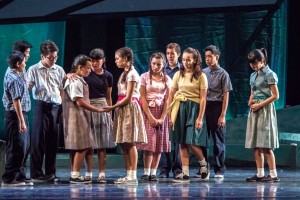
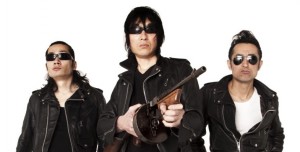


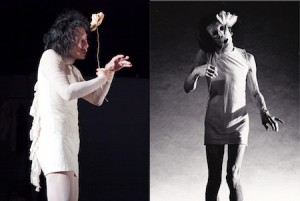
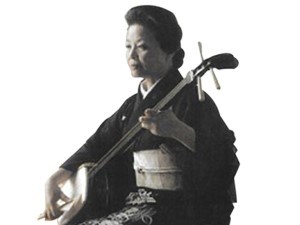
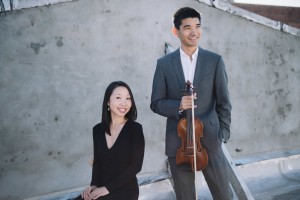

Comments are closed.